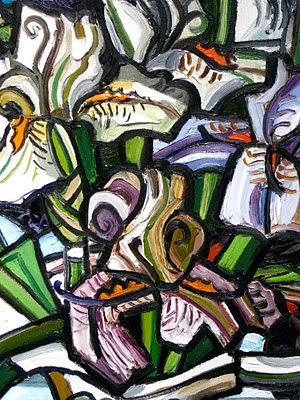
Monday, January 25, 2010
More Local Privet Problems

Saturday, January 23, 2010
A Duck made in the world of SculptCad
On site with Make Space: Installation
 Drove out to meet up with Sarah Jane Semrad and some of the other artists that are part of the La Reunion TX Make Space: Installation. The La Re Volunteers have been working had this past year to clear out new trails and spaces. I wish I had known, I could have collected a lot of privet.
Drove out to meet up with Sarah Jane Semrad and some of the other artists that are part of the La Reunion TX Make Space: Installation. The La Re Volunteers have been working had this past year to clear out new trails and spaces. I wish I had known, I could have collected a lot of privet.Thursday, January 21, 2010
Privet Gone Wild at La Reunion TX
 I am one of the artists in the 2010 La Reunion TX Make Space: Installation. My project is to make an architectural sculpture using privet. Privet is a plant from Asia. As you can see in the photo, it is a very aggressive and is quickly overtaking the Dallas Metroplex. Just about any creek or flood zone you look into you will see privet growing, acres and acres of privet. In this project I will be testing the viability of using the privet as a green and renewable building material.
I am one of the artists in the 2010 La Reunion TX Make Space: Installation. My project is to make an architectural sculpture using privet. Privet is a plant from Asia. As you can see in the photo, it is a very aggressive and is quickly overtaking the Dallas Metroplex. Just about any creek or flood zone you look into you will see privet growing, acres and acres of privet. In this project I will be testing the viability of using the privet as a green and renewable building material.
Friday, January 15, 2010
Frist Day as a ScultpCAD Rapid Artist

Had My first chance to play with the Free Form 3 D computer sculpting program today. Mostly just poking holes and making cheese doodles. I can see that this program has a lot of similarities to the tools found in Adobe Photoshop. But it seems a bit more user friendly. Then add the Phantom desktop carving tool which is a pencil like mouse that simulates the feel of carving into real material.
Next week I'll start using the tutorial to help me learn the program. I can see
Proposal for La Reunion Tx, Making Space: Installation

Privet: A non-native gone wild
During the time that I have spent at the La Reunion property it has always struck me how much the non-native shrubbery called privet has taken over the landscape. This plant, originally from Asia is very aggressive and hardy. It is used widely in the DFW metroplex as a decorative bush around houses and commercial builds. Unfortunately a single privet bush will produce 1000s of berries each year. These berries are often washed into the city’s storm drains which empty into the local creeks and streams. The result is that most of the creek banks and flood zones in the DFW area are now overgrown with privet. Once a privet bush is established, simply cutting it down cannot kill it. The root ball is like a Hydra, it will send up several new braches for each one that is cut off, totally replacing the old growth within a few short months. Privet is pushing out the native plants that native animals, birds and insects feed upon. This is creating vast areas of monocultures that only support other aggressive plants like poison ivy and insects like mosquitoes


Privet: An experiment in repurposing
The branches of privet are very long and thin, but also surprisingly strong. In this way privet resembles plants like the ocotillo, cane and bamboo, all fast growing plants that are widely used as building materials. Based on these natural characteristics, a team of artists will “harvest” privet branches from the La Reunion property and use them to construct a sculpture. This sculpture will be of a design and scale that calls explores the architectural validity of using privet as a building material. Documentation and photos will be taken throughout the project. After 12 months the sculpture will be dismantled, at which time documentation will focus on the condition of the sculpture and the structural stability of the privet.

If this field test proves that privet can be used as stable building material, it could turn the urban privet plague into a valid source for sustainable and green building materials

Thursday, January 14, 2010
David Bates at Dunn and Brown Contemporary

 From this platform of art historical connections David Bates launches into a series of paintings that are thick with paint, rich with deep color, and bold with mark making. When all combined, this show of Themes and Variations is a strong must see for those who love oil paint.
From this platform of art historical connections David Bates launches into a series of paintings that are thick with paint, rich with deep color, and bold with mark making. When all combined, this show of Themes and Variations is a strong must see for those who love oil paint.

